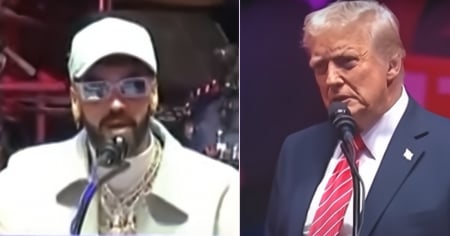Donald Trump held a large rally at the Capital One Arena in Washington, on the eve of his inauguration as the 47th president of the United States.
During his speech, he addressed key themes of his campaign and reiterated his commitment to immigration policy.
In one of the night's most powerful statements, he asserted: "On Monday afternoon, when the sun sets, the invasion of our borders will have stopped, and all illegal intruders, in one way or another, will be returned to their countries."
These words reflect the strong stance that characterized his previous term and which he now promises to intensify in his new period as president.
The reference to "the invasion of our borders" directly points to his proposal to strengthen immigration policies and reinforce border security, issues that have deeply divided public opinion in the United States.
Under the slogan "Rally of Victory," the event brought together more than 15,000 supporters who celebrated Trump's return to the White House.
Among the prominent attendees were entertainment figures such as Puerto Rican singer Anuel AA, musician Kid Rock, actor Jon Voight, and entrepreneur Elon Musk, who publicly expressed their support for the Republican leader.
The event also served as a space to celebrate what its supporters consider a historic victory, marked by the return of a leader who promises to restore what he defines as "the core values of America."
Trump thanked his supporters for their loyalty and urged them to remain active in defending his principles. The Republican is looking to solidify his support base as he charts the path toward a new presidential term that promises to be as controversial as the last.
Drastic changes in U.S. immigration policies.
Since Donald Trump was campaigning for the presidency, his policies against illegal immigration have sparked controversy both inside and outside of the United States.
On January 21, just a day after taking office, his administration plans to carry out mass arrests of undocumented immigrants in key cities like Chicago, with a particular focus on individuals with criminal records.
These raids are part of a broader plan that includes reactivating Title 42 and eliminating tools such as the CBP One application, used to manage immigration appointments.
Additionally, the elected president's strategy includes reinstating the "Remain in Mexico" program, which has raised concerns about potential human rights violations.
Among the most controversial proposals is the use of legal tools and economic pressure to compel countries like Cuba, Nicaragua, and China to accept the deportation of their citizens.
Citing Section 243(d) of the Immigration and Nationality Act, Trump could suspend the issuance of visas to citizens of countries that do not cooperate with deportations.
These measures are part of Project 2025, designed to reinforce border security and reduce illegal immigration, although at the cost of creating significant diplomatic tensions.
In a recent interview, the president defended his straightforward approach to mass deportations, stating that there is no other option in the face of the criminality of certain immigrants.
Although he expressed his interest in encouraging the legal entry of individuals and businesses willing to contribute to the country, his emphasis on prioritizing border security has received mixed reactions, particularly from immigrant communities that fear an even tougher stance on immigration policies.
Filed under:
